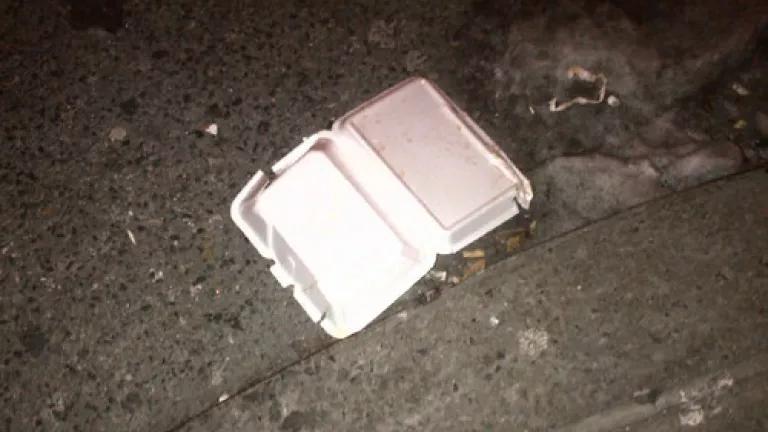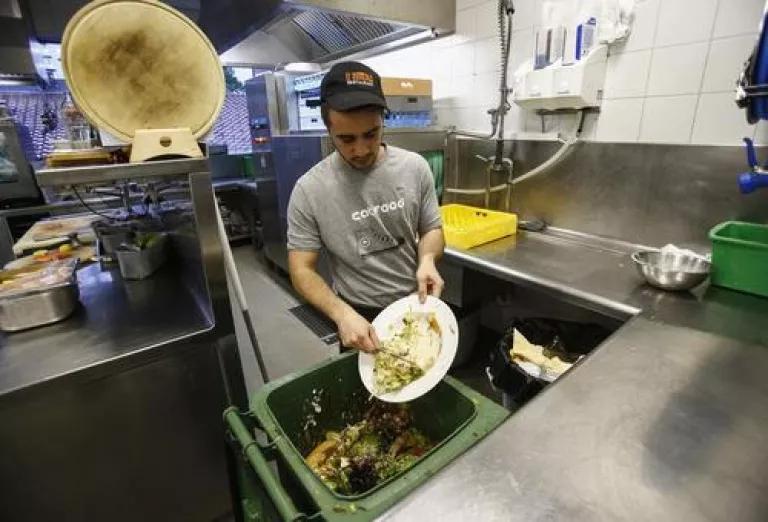Proposals to Ban Polystyrene Foam Containers and Set New Requirements for Restaurant Food Waste Composting On Launchpad in New York City Council

The New York City Council – as part of a flurry of activity at its final regular session of the year -- seems likely to enact two significant pieces of solid waste reform legislation today.
One bill would put New York City on the pathway to prohibiting restaurants and other food establishments from using polystyrene foam food and beverage containers. The second bill would require city restaurants, hotels and other large food providers to insure that their food wastes are separated for and disposed of at composting facilities, rather than being sent to landfills or incinerators, once such composting facilities in the region are up and running.
Passage of both bills would cap a remarkable eighteen month period of activity by the Bloomberg Administration and the New York City Council in which the city’s highest officials have worked to transform the way waste is handled in the nation’s largest city.
Polystyrene foam food container litters corner of Seventh Avenue and 17th Street, 6:30 PM, December 16, 2013. Scenes such as this, which are commonplace throughout the city, could become a thing of the past, if New York City Council votes to phase out polystyrene food and beverage containers by July 2015.
Polystyrene Food and Beverage Containers are Going, Going …
Polystyrene food and beverage containers have received lots of attention from sanitation officials around the nation in recent years -- largely because these brittle, white foam products so often become litter that breaks into small pieces and ends up along sidewalks, streets, parks and waterways. Due to their light weight and the fact that they are often soiled with food scraps, cooking grease, etc., polystyrene foam containers have proven virtually impossible to recycle cost-effectively.
Nearly 100 cities and towns, including San Francisco, Seattle and Portland have banned polystyrene food and beverages containers for exactly these reasons. (And just last week, the County Executive for Albany County, N.Y., signed a bill that will end the use of such containers by large chain stores in that jurisdiction.)
The proposed NYC legislation, Intro. 1060-A -- sponsored by Councilmember Lew Fidler and 20 others -- would prohibit restaurants, coffee shops and food stands from dispensing polystyrene foam food and beverage containers after July 1, 2015 (unless the Sanitation Commissioner determines that such containers can be recycled in a manner that is “environmentally effective” and “economically feasible”). (Other cities – most recently San Jose -- have explored whether recycling is feasible for polystyrene foam food containers and have concluded that it is not.)
The bill has been revised, following a recent City Council Sanitation Committee hearing, to add a financial hardship waiver for any business that has a gross income under $500,000 per year and that establishes that it cannot obtain comparably priced non-polystyrene substitute containers. A second amendment eliminates all fines for any violations of the law before January 2016, and instead directs that businesses receive only warnings and information on where to obtain non-polystyrene containers for their food service needs during this transition period.
A final provision of the bill, which has gone largely unnoticed, would require the Sanitation Commissioner to prohibit the sale of polystyrene foam “packing peanuts” as of July 2015 (again, unless the Commissioner were to determine that polystyrene foam containers can be recycled in and economically and environmentally sound manner).
The American Chemistry Council, the Michigan-based Dart Container Corporation – The nation’s largest manufacturer of polystyrene food and beverage containers – and their allies reportedly spent close to one million dollars in political expenditures to influence the outcome of the New York City Council’s deliberations on this issue. At least as of this moment, their self-interested advocacy efforts appear not to have succeeded.
Passage of this bill would be a symbolic and substantive victory that should make New York’s streets, parks and waterways cleaner and relieve the Sanitation Department from having to deal with one of the most troublesome products in the city’s waste stream.
Restaurant Food Waste Today, Valuable Compost Tomorrow

The New York City Council is expected to pass legislation that would usher in a major change in food waste policy in the nation’s largest city. Beginning in 2015, assuming sufficient composting capacity exists within the region, restaurants and other large food generators would be required to send their food scraps to such facilities (and not to landfills or incinerators) -- a move that will produce useful farmland fertilizer, reduce emissions of climate-changing methane gas, and ultimately trim disposal costs for food and yard waste.
The second piece of legislation to be voted on today has attracted far less attention than the polystyrene bill. But, if passed, it too could have a significant impact on New York City waste policies in the 21st century.
This proposal, Intro. 1162-A – introduced by Sanitation Chair and Public Advocate-elect Tish James and nine others -- would direct large restaurants, catering establishments, food wholesalers, grocery stores, stadiums, etc. to arrange for the food waste they produce to be collected for and/or disposed of by composting or related, similarly sustainable methods starting in July 2015, assuming sufficient capacity to accept such compostable wastes exists or is created by then within the metropolitan area.
New York’s food establishments produce huge volumes of food waste – well over 1,000 tons a day according to city figures. Sending such wastes to landfills or incinerators is increasingly expensive, generates significant amounts of global warming pollution, and wastes the valuable resources that food scraps and other organic waste really are. In contrast, composting operations (and similarly benign anaerobic digestion facilities) capture and reuse these food wastes – for wholesome fertilizers, to reduce the need for pesticides, for soil stabilizers and in the case of anaerobic digestion to produce valuable clean energy in the form of biogas.
For all these reasons, other localities are taking steps to advance composting and anaerobic digestion for their commercial (and residential) municipal food waste streams. Massachusetts, for example, adopted a program earlier this year that will require all restaurants and food waste generators over a certain size to send their wastes to anaerobic digesters, rather than landfills.
Already, in New York City, many forward-looking restaurant owners have sought to have their food scraps composted, rather than landfilled. But sufficient local capacity for composting has been hard to find.
The beauty of the proposed bill is that it will end the chicken-and-egg problem and encourage investment in new composting and anaerobic digestion facilities in the New York metropolitan area.
If this legislation passes and such capacity is built, it will also spur the success of the city’s recently started residential food waste collection program. And since food waste and yard waste account for over 25% of the city’s residential waste stream, securing facilities to handle such organic wastes in a sustainable manner could bring about dramatic changes in New York City waste handling operations, in just a matter of years.
In short, in passing this bill, the City Council is launching a three-stage rocket to carry New York into a future where the food scraps of today become the compost and biogas of tomorrow.
Special thanks to the many organizations and neighborhood activists who helped educate fellow New Yorkers on these two issues and helped bring about what looks to be a significant double-victory. Among the many stars were: Cafeteria Culture; Citizens Committee for New York City; Green Schools Alliance; Lower East Side Ecology Center; Manhattan Solid Waste Advisory Board; New York League of Conservation Voters; New York Public Interest Research Group; No Impact Project; Plasticbaglaws.org; and We Act for Environmental Justice. Last but not least, we extend our sincere thanks to Speaker Chris Quinn and her talented staff, not only for their work on these two bills, but for leading the City Council in advancing many important environmental policies over the past eight years.
